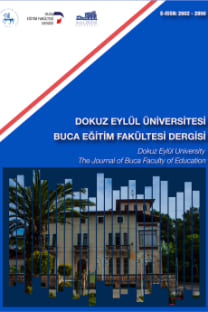ÖĞRETMEN ADAYLARİNİN ÖĞRETMEN EĞİTİMİNDEKİ MODELLER HAKKİNDA GÖRÜŞLERİNİN İNCELENMESİ
Bu araştırmada öğretmen yetiştirme programlarında kullanılan “beceri modeli”, “uygulanmış bilim modeli” ve “yansıtma modeli” öğretmen adaylarının görüşleri alınarak karşılaştırılmalı olarak incelenmiştir. Araştırmaya MAKU Eğitim Fakültesi Sınıf Öğretmenliği, Türkçe Öğretmenliği, Resim Öğretmenliği, İngilizce Öğretmenliği ve Beden Eğitimi Öğretmenliği programlarında öğrenim gören toplam 133 öğretmen adayı katılmıştır. Veriler, Ekiz ve Yiğit (2006) tarafından geliştirilen bir anket aracılığı ile elde edilmiş olup, SPSS 15.0 paket programı kullanılarak değerlendirilmiştir. Değerlendirme sonucunda, öğretmen adaylarının, beceri modeli ve uygulanmış bilim modeline ilişkin olumsuz görüş bildirdikleri saptanmıştır. Öte yandan, Beden Eğitimi Öğretmenliği programındaki öğretmen adaylarının öğretmen eğitimi modellerinden beceri modeline olumlu yönde görüş bildirdikleri belirlenmiştir. Yine, araştırmaya katılan, tüm programlardaki öğretmen adayları yansıtma modeline ilişkin olumlu görüş bildirmekte ve genel olarak yansıtma modelinin öğretim programlarına dâhil edilmesiyle daha etkili bir öğretmen olacaklarına inanmaktadırlar. Araştırma sonuçlarının, öğretmen yetiştirme sürecine ışık tutacağı düşünülmektedir.
Anahtar Kelimeler:
Öğretmen yetiştirme modelleri, öğretmen yetiştirme, uygulanmış bilim modeli, beceri modeli, yansıtma modeli
EVALUATION OF TEACHER TRAINEES‟ OPINIONS ABOUT TEACHER TRAINING MODELS
Qualifications of the teacher who has an active role during this process gains importance. In this study, “craft model”, applied science model” and “reflective model” used in teacher training programs are comparatively assessed by getting the opinions of teacher trainees. 133t teacher trainees studying in departments of Primary Teacher Education, Turkish Language Teacher Education, English Language Teacher Education, Art Teacher Education, and Physical Education Teacher Education programs in Faculty of Education at Mehmet Akif Ersoy University are participated in the study. A questionnaire formed by Ekiz and Yiğit (2006) is used as data collection instrument and data are evaluated by SPSS 15.0 package software. According to results of the research, it is seen that the teacher trainees have negative views on craft and applied science models. On the other hand, teacher trainees in the Physical Education Teacher Education have positive views on craft model. Moreover, all the teacher trainees in the research stated positive views on reflective model and believe that they would be more effective teachers when reflective model is included in the programs. It is thought that results of the research will offer some significant tips about how teacher training process.
Keywords:
Teacher training models, teacher training, applied science model, craft model, reflective model.,
___
- Atay, D. Y. (2003). Öğretmen eğitiminin değişen yüzü. Ankara: Nobel Yayıncılık.
- Aydin , E. (2009). An Evaluation of the Aims of the Faculty SchoolPartnership Sheme by Mathematics Student Teachers and their Mentors. Journal of Instructional Psychology. 36, (3), 273-281
- Başaran, İ. E. (1989). Eğitim Psikolojisi. Ankara: Emel Matbaacılık.
- Busher, Hugh, Simmons & Cyril. (1992). Living with CATE: The Case of Reflective Student Teachers.Educational Studies,18, (1). Şubat,02,2010 tarihinde Academic Search Complete veritabanından alınmıştır.
- Ekiz, D. (2003). Sınıf öğretmeni adaylarının öğretmen eğitimindeki modeller hakkında düşünceleri. Milli Eğitim Dergisi. 158, 146-160.
- Ekiz, D. (2006). Öğretmen eğitimi ve öğretimde yaklaşımlar, Ankara: Nobel Yayıncılık.
- Ekiz, D. ve Yiğit, N. (2006). Öğretmen adaylarının öğretmen eğitimindeki modeller hakkında görüşlerinin farklı programlar açısından incelenmesi. İlköğretim Online. 5 (2), 110 – 122.
- _______ (2007). Öğretmen adaylarının öğretmen eğitimindeki modeller hakkında görüşlerinin program ve cinsiyet değişkenleri açısından incelenmesi. Türk Eğitim Bilimleri Dergisi. 5 (3), 543 – 557.
- Fidan, N. ve Erden, M. (1998). Eğitime Giriş. İstanbul: Aklim Yayınevi.
- Holligan, C. (1997). Theory in Initial Teacher Education: Students' Perspectives on Its Utility: A Case Study. British Educational Research Journal, 23, (4), 533-551.Şubat, 17, 2010 tarihinde JSTOR veritabanından alınmıştır. http://www.jstor.org/stable/1502085‟ e bakınız.
- Laursen, P. F. (1996). Professionalism and the reflective approach to teaching. In M. Kompf, W. R. Bond, D. Dworet & R. T. Boak (Eds.), Changing research and practice: Teachers’ professionalism identities and knowledge. London & Washington: The Falmer Pres.
- Kagan, D. M. (1992). Professional Growth Among Preservice and Beginning Teachers. Review of Educational Research, 62, (2), 129-169.
- Korthagen, F. A. J. & Kessesls, J. P. A. (1999) Linking Theory and Practice: Changing the Pedagogy of Teacher Education. Educational Researcher, 28, (4), 4-17. Şubat, 03, 2010 tarihinde JSTOR veritabanından alınmıştır. http://www.jstor.org/stable/1176444‟e bakınız.
- Özyurt, S. (2000). Öğretmenlik Mesleğine Giriş. Adapazarı: Değişim Yayınları
- Pollard, A. (2002). Reflective Teaching. London: Continuum.
- Silcock,P. (1994). The Process of Reflective Teaching. British Journal of Educational Studies.42, (3), 273-285. Şubat 03, 2010 tarihinde jstor veritabanından alınmıştır. http://www.jstor.org/stable/31218862ya bakınız.
- Smith, K & Lev-Ari, L. (2005).The place of the practicum in preservice teacher education: the voice of the students. Asia-Pacific Journal of Teacher Education,33,(3), 289–302
- Smith,R. (1999). Ten years of competency based training: the experience of accredited training providers in Austrailia. Journal ofTtraining and Development, 3,2
- Sönmez, V. (2006). Eğitim Bilimine Giriş. (2. Baskı). Ankara: Anı Yayıncılık. Wallace, M. J. (1997). Training foreign language teachers. (6. Baskı). New York, NY: Cambridge University Pres.
- Zeichner, K. (1999). The New Scholarship in Teacher Education. American Educational Research Association, 28,(9),4-15. Şubat,03,2010 tarihinde JSTOR veritabanından alınmıştır. : http://www.jstor.org/stable/1177196‟ya bakınız.
- Yayın Aralığı: Yılda 4 Sayı
- Başlangıç: 1992
- Yayıncı: Dokuz Eylül Üniversitesi
Sayıdaki Diğer Makaleler
İŞİTME ENGELİ OLAN BİREYLER VE ZİHİN KURAMI
ÖĞRETMEN-ÇOCUK İLİŞKİLERİNİN ÇEŞİTLİ DEĞİŞKENLER AÇISINDAN İNCELENMESİ
YATILI İLKÖĞRETİM BÖLGE OKULLARININ SORUNLARINA İLİŞKİN ÖĞRENCİ VE ÖĞRETMEN GÖRÜŞLERİ
ÖĞRETİMSEL LİDERLİK BOYUTU ÜZERİNE ÜNİVERSİTE MEZUNLARININ BAKIŞ AÇILARI
İLKÖĞRETİM I. KADEME VERİLEN PERFORMANS GÖREVLERİNİN ÖĞRETMEN GÖRÜŞLERİ AÇISINDAN DEĞERLENDİRİLMESİ
ÖĞRETMEN ADAYLARİNİN ÖĞRETMEN EĞİTİMİNDEKİ MODELLER HAKKİNDA GÖRÜŞLERİNİN İNCELENMESİ
AKRAN DÖNÜT EĞĠTĠMĠ PROGRAMININ YAZMA BECERĠLERĠNĠN GELĠġĠMĠ ÜZERĠNDEKĠ ETKĠSĠ
Sibel Kılınç Alpat, Melis Arzu Uyulgan, Özge Özbayrak, Şenol Alpat
Öğretmen görüşlerine göre çeşitli yönetim becerilerinin okul müdürleri için önem dereceleri
